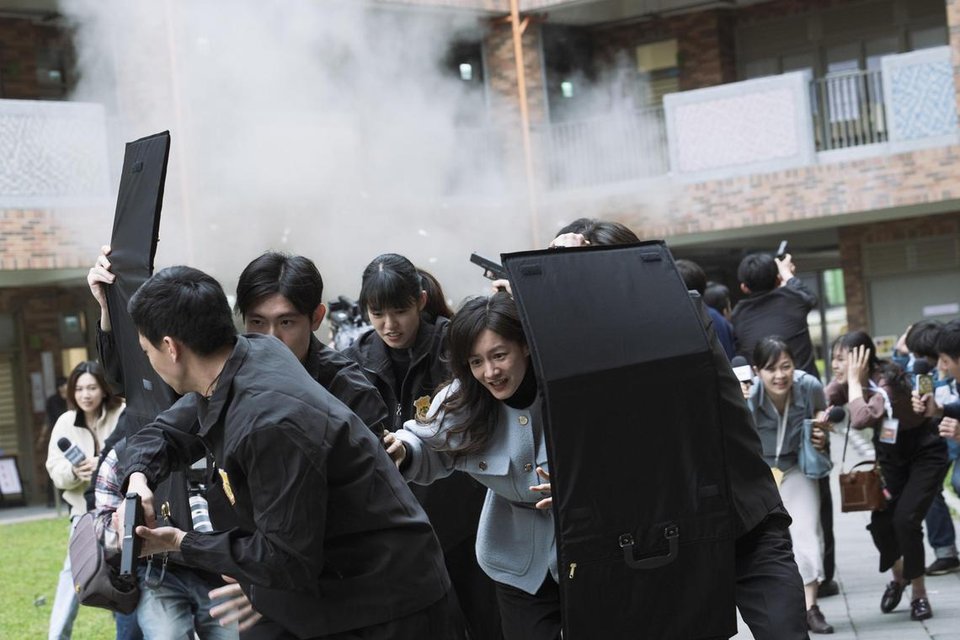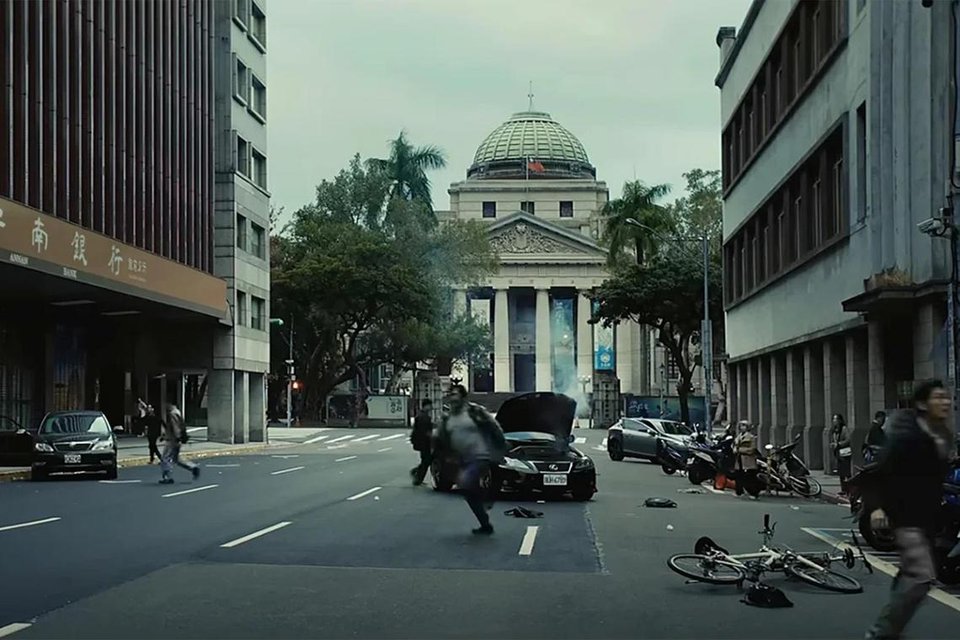July 31, 2025
TAIPEI – As enemy warplanes and ships surround an island in a military blockade, chaos ensues on city streets: Convenience stores are looted, the internet is knocked out and panicked residents attempt to flee.
These are scenes from Zero Day Attack, a new Taiwanese television fictional series. The show so realistically portrays what a Chinese invasion of Taiwan could look like that it is also a wake-up call for the territory’s residents.
Ahead of its release on Aug 2, trailers of the 10-episode drama – the first of its kind – have already sparked discussions and emotional reactions over a potential conflict close to home.
“Goosebumps! It’s hard to imagine how we will face it when the day (of invasion) comes… When the day comes, will Taiwanese be ready? It takes only one moment to lose our freedom,” wrote a YouTube user in a comment that has garnered more than 3,600 upvotes.
Taiwan has lived under Beijing’s constant military threat of “reunification” for decades, leading to fears in some quarters that most Taiwanese people have become desensitised to the dangers of a possible war.
According to a March poll by the Institute for National Defence and Security Research (INDSR), a Taiwanese think-tank, China was listed as Taiwan’s greatest threat to national security in the next five years, but only 33 per cent of those surveyed said they believed it.
Some respondents were more concerned about declining birth rates (27 per cent) and economic stagnation (18 per cent).
These findings have been consistent for the past several years, even as Beijing has considerably ratcheted up its military pressure against Taiwan during the same time period, staging massive war games around the island and sending warplanes and ships almost daily.
“People have been subjected to military harassment by the Chinese Communist Party of China for a long time, which may have led to a weakening of the public’s sense of the threat,” said Dr Christina Chen, an INDSR researcher.
That is partly what drove TV producer Cheng Hsin-mei to create Zero Day Attack in the first place.
“We hope that this show will awaken Taiwanese people to the looming threat of war,” she said at a recent publicity event attended by The Straits Times.
Ms Cheng, who also penned one of the show’s episodes, is a Golden Bell award-winning screenwriter behind the 2015 drama The Best Of Youth.
A new episode of Zero Day Attack will be launched every week on Taiwan’s Public Television Service from Aug 2 before the show gets its international premiere on Japan’s Amazon Prime Video on Aug 15.

Trailers of the 10-episode drama have sparked discussions and emotional reactions over a potential conflict close to home. PHOTO: ZERO DAY ATTACK/THE STRAITS TIMES
A central message of the series, which is partly funded by the Taiwan government, is the importance of societal resilience, and how every civilian – and not just the military – has a part to play in the event of an invasion.
This aligns with Taiwanese President Lai Ching-te’s whole-of-society resilience strategy, which aims to strengthen civilian preparedness in the face of Beijing’s aggression. This strategy includes civil defence training, as well as testing responses to communications blackouts and transportation disruptions.
“It is said that an ounce of prevention is better than a pound of cure,” Mr Lai said in a speech in March.
“To ensure Taiwan’s security, we hope to rely not just on the armed forces, but also on the forces of defence resilience throughout our society. In that way, we can achieve peace through strength,” he added.
In July, Taiwan’s largest annual Han Kuang military exercise manifested this strategy, combining conventional war games with urban survival drills for the first time.
Some of the civil defence activities included simulations of mass evacuations from supermarkets and department stores during an air raid.
In fact, traditional military clashes do not make up the bulk of Zero Day Attack.
Instead, the series casts a spotlight on other forms of aggression, including cognitive warfare and grey-zone tactics, which utilise tools such as disinformation, cyber attacks and influence campaigns to wear down an adversary and cause panic.
In one scene, the Taiwanese president’s emergency address is hacked during a live broadcast, replaced by a smiling Chinese state news anchor urging the Taiwanese to accept the “peaceful reunification of the motherland”.
Ms Cheng, the producer, said Beijing has already been employing non-military offensives against Taiwan.
“For me, the war has already begun in Taiwan – it is not being fought with guns and cannons but through information and infiltration,” she said.
According to a long-running study by Swedish research institute V-Dem Institute, Taiwan has consistently topped the list of territories most affected by disinformation – most of which originates from China.
Data from Taiwan’s National Security Bureau also showed that 64 Taiwanese were charged over Chinese espionage in 2024, three times more than in 2021.
Even before it is shown, Zero Day Attack has already attracted the ire of Beijing.
On July 30, when asked to comment on the show at a regular news conference, Beijing’s Defence Ministry spokesman Zhang Xiaogang slammed Taiwan’s ruling Democratic Progressive Party (DPP).
“The DPP authorities want to force compatriots on both sides of the Taiwan Strait into conflict and to harm and ruin one another. They will find no support and their schemes will fail,” he said.

A still from Zero Day Attack of panic unfolding on a street. The show’s realistic portrayals of what a Chinese invasion of Taiwan could look like is a wake-up call for the territory’s residents. PHOTO: ZERO DAY ATTACK/FACEBOOK/THE STRAITS TIMES
Before Zero Day Attack, Taiwanese TV show creators had rarely dared to address the topic so directly for fear of losing access to the lucrative Chinese entertainment market.
When Taiwanese pop stars and actors are found to be critical of Beijing, for instance, they are often blacklisted. Reportedly, Taiwanese performing artists have also been coerced into signing written pledges to support Beijing’s territorial claim over Taiwan in order to be allowed to work on the mainland.
In the case of Zero Day Attack, some crew members dropped out of the production at the last minute; more than half of the TV show crew also asked to be left out of the credits list.
But Ms Cheng pushed on to complete the series, whose cast includes Taiwanese-American actress Janet Hsieh, Taiwanese actor Kaiser Chuang and Hong Kong’s Chapman To, a vocal critic of Beijing, who became a naturalised Taiwanese in 2022.
“This TV show is a story that only Taiwanese people can tell – and one that urgently needs to be told,” said Ms Cheng.
“I hope that while Taiwanese audiences enjoy its entertainment value, they will also become more aware of the infiltration of modern grey-zone warfare,” she added.
Mr Marvin Park, a non-resident senior fellow at the Atlantic Council, a Washington-based think-tank, noted in a brief that the series’ trailer has already “captured people’s imaginations in a way that official government messaging efforts are unlikely to achieve”.
“The goal is not for people to conclude there’s no point in resistance but to spur action towards resilience efforts now,” he wrote.
Additional reporting by Michelle Ng in Beijing


